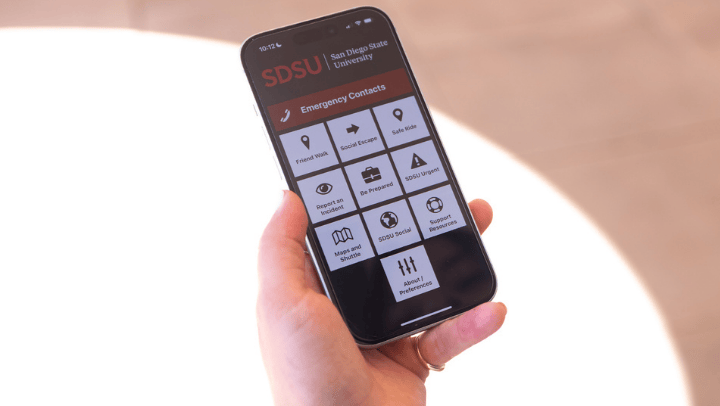Driving The Future of Transportation Infrastructure
SDSU brings a West Coast perspective to a consortium with $28 million in funding to explore the future of transportation.

“We were chosen to be part of this center because of the SDSU transportation group’s expertise in innovative research in traffic safety, advanced-vehicle technologies, and big data analytics.”
Last year, there were more than 250 million cars and trucks on the road in the United States, with more than 35,000 vehicle-related fatalities. Vehicle collisions are the most common non-illness-related way to die in this country. Yet the American driving landscape is changing rapidly, with driverless and semi-automated cars, ride-sharing and connected vehicles all growing quickly in popularity and ubiquity. To help understand how these changes will impact both driver and pedestrian safety, the U.S. Department of Transportation (USDOT) has awarded a five-year grant that, including matching funds, will total $28 million to a consortium consisting of San Diego State University, the Virginia Tech Transportation Institute (VTTI) and the Texas A&M Transportation Institute (TTI). The center is named “Safety through Disruption (SafeD): Goal Zero” and will be led by the VTTI.
“One of the challenges that future transportation engineers face is finding ways to promote safety when a vast amount of data is generated from an ever-growing number of smart devices that connect vehicles, humans, and infrastructure,” said Morteza Monte Mehrabadi, dean of the College of Engineering.
To address this challenge, the Fixing America’s Surface Transportation Act was passed in 2015, authorizing funding for a handful of national University Transportation Centers, including the VTTI-TTI-SDSU consortium. USDOT will provide $2.8 million per year over five years, with matching funds from university, state and private sources bringing the total funding to $28 million.
Congresswoman Susan Davis (D-San Diego), whose district includes SDSU, said that the funding "demonstrates the leadership role San Diego State plays when it comes to research and innovation. The San Diego region is no stranger to the transportation challenges facing the country. The research done at SDSU will help us meet those challenges and develop the leaders in transportation to take us into the future.”
The selection process to become a University Transportation Center was highly competitive, said Sahar Ghanipoor Machiani, director of SDSU’s role in the consortium. To be part of this esteemed consortium speaks to the strengths of SDSU’s civil engineering program.
“We were chosen to be part of this center because of the SDSU transportation group’s expertise in innovative research in traffic safety, advanced-vehicle technologies, and big data analytics," said Machiani, assistant professor of transportation engineering in the Department of Civil, Construction, and Environmental Engineering. “We also provide a West Coast perspective. SDSU will be a critical member of the consortium offering young, passionate transportation faculty with strong motivations for innovative research, as well as outstanding access to education and workforce development opportunities."
As part of the consortium, SDSU will study how to maximize safety as transportation technology advances. As self-driving cars become more common, ride-sharing increases in popularity, and vehicles are produced that can wirelessly communicate with one another and with centralized traffic centers, it's important to study how all of these changes will affect road users' safety, Machiani said.
One specific problem SDSU plans to study is how drivers should be trained differently for automated and connected vehicles.
“The new generation of vehicles offers increasing automation and warnings," she said. "These systems sometimes confuse drivers, reducing their potential effectiveness. Additional training and driver license endorsements to operate these vehicles could help with addressing this issue."
Machiani and other SDSU researchers will take advantage of SDSU’s own driving simulator, as well as the Virginia Tech Transportation Institute’s state-of-the-art driving facility in Blacksburg, Va.
Another emphasis of the center will be educating and training civil engineers prepared to tackle the transportation issues of the future. That feeds into one of the university’s long-term objectives for College of Engineering: establishing a full-scale transportation research program at SDSU.
“SDSU offers the only transportation engineering program in San Diego and the new University Transportation Center will help us in our efforts to build upon our teaching and research capacity in preparing the next generation of transportation engineers,” Mehrabadi said.



